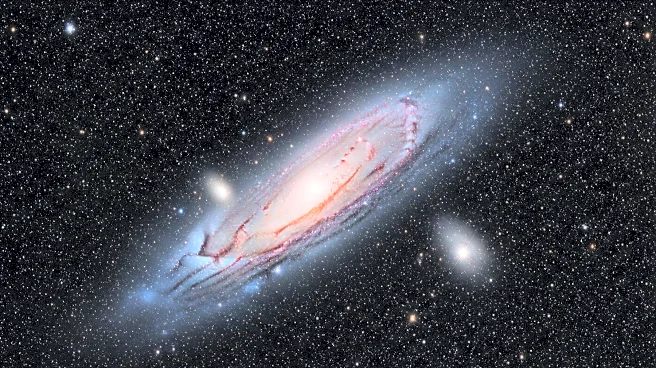What is the story about?
What's Happening?
Astronomy Magazine delves into the historical significance of the Andromeda Galaxy (M31), highlighting its role in shaping our understanding of the universe. Initially considered a 'nebulous smear,' Andromeda was central to the 'island universe' hypothesis, suggesting it was an independent star system beyond the Milky Way. Key discoveries, such as Henrietta Leavitt's period-luminosity relationship for Cepheid variable stars and Vesto Slipher's observations of spiral nebulae radial velocities, supported the extragalactic nature of these objects. Edwin Hubble's identification of a Cepheid variable in M31 in 1923 confirmed its status as a distinct galaxy, expanding the perceived scale of the universe.
Why It's Important?
The confirmation of the Andromeda Galaxy as a separate galaxy was a pivotal moment in astronomy, fundamentally altering our understanding of the universe's structure. It marked the transition from viewing the Milky Way as the entirety of the universe to recognizing the existence of countless other galaxies. This discovery laid the groundwork for the concept of an expanding universe, influencing subsequent research and theories in cosmology. The advancements in telescope technology and stellar spectroscopy that facilitated these discoveries underscore the importance of scientific innovation in expanding human knowledge.
What's Next?
The study of the Andromeda Galaxy continues to be a focus for astronomers, as it offers insights into galaxy formation and evolution. Future research may explore the potential collision between the Milky Way and Andromeda, predicted to occur in several billion years. This event could provide valuable information about the dynamics of galaxy mergers and their impact on star systems. Additionally, ongoing advancements in telescope technology and observational techniques will likely yield new discoveries about Andromeda and other galaxies.
Beyond the Headlines
The historical debate over Andromeda's nature reflects broader themes in scientific inquiry, such as the importance of challenging established paradigms and the role of technological innovation in driving discovery. The story of Andromeda also highlights the collaborative nature of scientific progress, with contributions from numerous astronomers over centuries leading to a deeper understanding of the cosmos. As we continue to explore the universe, the legacy of these early discoveries serves as a reminder of the transformative power of curiosity and perseverance.

















